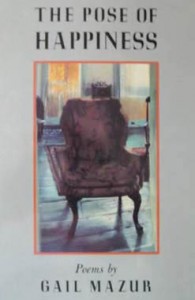GAIL MAZUR ASKS what can be unequivocal or kept in a “radiant” world that begins in unconsciousness and ends in a graveyard. Again and again, after each new loss, her poems insists that “What’s left must be spirit, / or the life of the mind— / or the will to turn outward. . . .” Nothing is unequivocal: at the end of “In the Dark Our Story,” the wife is “happy— / no, not happy, but in the pose of happiness / I’ve seen in pictures . . .” Again and again, we yearn for the inaccessible unconsciousness of nature or childhood: “to be unknown / to myself again, like the catbrier, / savage in its random scratchings.” These poems communicate a sense of woe at how little can be kept. This sense is all the greater because Mazur insists that hers is the general condition: “I’m prdinary—my fears are ordinary.” The only hope that the life of spirit or mind can keep anything at all, is through art: she imagines even the catbird hopes “to find the song he’s given to sing.” In these poems, Mazur has found the songs she’s been given to sing—authentic, preserved by elegant art, and moving.
—Frank Bidart
With her fluid yet colloquial line, and her gift for precise observation, Mazur depicts the mind in all its reflective, reflexive operations. Her poems show how it feels to think, enacting a process of finding and affirming one’s own “bewildering part in this world.” . . . [Her poetry] is tough, smart, passionate, and deeply humane.
—Joyce Peseroff, Provincetown Arts
[Mazur’s poetry] is guided not by a feel for what is grim, but by humor, compassion, love, and skill.
—The Nation
